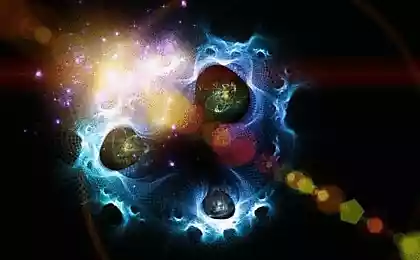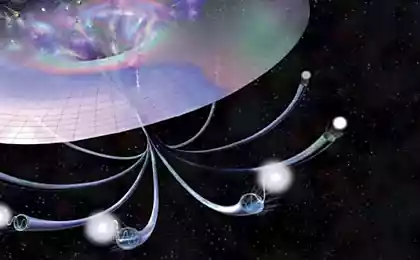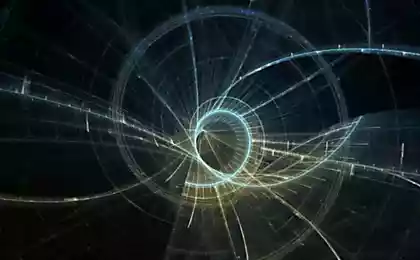741
Quantum physics and human consciousness

MENA MIKHAIL BORISOVICH — doctor of physico-mathematical Sciences, Professor, chief researcher of the Physical Institute. Lebedev, Russian Academy of Sciences.
"If we understand that we are indeed approaching global crisis, for the salvation of mankind most people have to go to a new consciousness, altruistic. This, in fact, is the salvation of the world."— Currently we live in the false, the ever-accelerating world, when human consciousness has not time to perceive what is happening and react to it. Tell me, please, from the point of view of the concept of consciousness in context of quantum mechanics can explain all these accelerating processes?
The world has become very complicated and difficult for anyone in this world lives, in particular, due to the fact that too much information around and too many events per unit of time. Life is not slow, calm as before — she was "crazy". So the human psychology is now playing a greater role than before. In the context of psychology is very important, of course, to understand what human consciousness is. And here unexpectedly it turned out that a new word might say quantum mechanics or quantum theory in General, as it allows us to look at consciousness is not so, as this seems only possible if we do not use the concept of quantum mechanics.
Very important aspects of consciousness seem so weird that many people think they do contradict science. The unusual properties of consciousness referred to as mystical, due to the fact that our world is actually quantum.
The quantum approach to the phenomenon of consciousness, the explanation from the point of view of quantum mechanics that such a consciousness is not new. This new approach seems therefore that only in recent years it began intensively to explore and develop, although it was first proposed almost at the same time, when there was the emergence of quantum mechanics. But now we are ready to master the legacy of Jung and Pauli. The paradox of Einstein-Podolsky-Rosen and bell's theorem demonstrate that the quantum world is different from what we imagine when we use classical physics, and how it appears to our intuition, and these radical differences. And bell's theorem and the Einstein-Podolsky-Rosen show it. Especially if you rely on ASPEC's experiments.
But how to describe this world to consider, not to lose its quantum properties? This helps interpretation of Hugh Everett. It is assumed that the difference of the quantum world from the classical can be described as follows: the quantum world has many faces — he has a lot of the classic individuals or classic projection. Thus, if you look at the quantum world on the one hand, we will see one classic film, if, on the other – will be a completely different classical picture.
Could it be, for example, that the sky is, for example, light is a picture of our world, and the sky is overcast – it is a different picture. Can there be a condition that includes both of these aspects, that is, is their superposition? From the point of view of classical physics it is meaningless, but because our world is quantum, then it is possible.
— What is quantum concept of consciousness? Can a person who based on this knowledge, a new way to learn how to perceive the events?
It is necessary to note two basic properties of consciousness that are possible to explain within the concept of Everett: first – sverginate, and the second control subjective reality. Very strange properties, because, for example, sverginate is getting information from nowhere, that is, collecting information about our world, which in the conscious state can not be obtained.
In the conscious state we see only one classical picture of the world and not able to see two at the same time. And in fact, there are not only two, but a huge number of pictures, and they are only together describe the quantum world completely. It is clear that from such a "database" which consists of a huge number of classical paintings, information you can get much more. And when we see only one picture, that is, remain in a conscious state, this information is simply not.
So, sverginate is the ability to penetrate into the quantum world as a whole and to obtain information of all the classic images at a time. But if we think in terms of one picture, in one of the classical world, it seems to us that this information is nowhere, because "only" the classical world, this information is not and can not be. But, nevertheless, we get it, because our world is quantum.
How to receive this information? Physics indicates that it's possible. But the representatives of some Eastern religions or Eastern philosophies (e.g., yoga, Buddhists etc) have long learned how to do it.
This can be done by people who have undergone special psychological training. And the main point of this exercise is to turn off our everyday consciousness, which allows you to see the world in the conventional images (visual, tactile, gustatory, and so on) and to support their thinking.
You must disable the process of habitual thinking, as if to make his mind empty, and then there is the penetration into the quantum world. In fact, the possibility of penetration into the quantum world is always there, but a bright static picture we see in front of him, closes to us the door into the quantum world as a whole, it does not allow to see other classic pictures. But if we disconnect the conscious mind, then we "see" the other pictures (the mechanism to achieve this is a psychological practice.
It turns out that the quantum world must inevitably be information other than what we see in our conscious state. Everett admits that macroscopically distinguishable States can be in superposition. What does it mean? So, we cannot say that the brain is in the state corresponding to the first picture, or that he is in a state which corresponds to the second picture. No, he is in a superposition corresponding to the two images. Actually, in reality, infinitely many of them.
For me, my consciousness, my perception of other people is a foreign objects, this part of the world which to me is external. But if the entire chain we analyze, we turn to the quantum description of all this, we come to what "actually", that is, in the full description of the quantum state of the world I as part of the world and the whole world is one and indivisible. It is difficult to follow the logic in words, but all other observers, too, as part of the world, inseparable from each other.
Thus, in a state where the normal consciousness is extinguished, but instead of this, there is access to all alternative classical States, i.e., to the quantum world as a whole, indeed, the world and I are one.
Physics and here we unexpectedly leads to a very old philosophical concept: "the Microcosm: the world within man." Philosophy long ago came to this conclusion, but physics comes to this rather complicated way. But comes to the same. And it's very interesting.
-If the world in the perception of the conditional, why does it survive the crisis, and quite painful? After all, determines the desire of man...
If we exclude from consideration the person and just take a regular nature, including living nature: animals, plants, etc., as religion says, "God is in control". And when man appeared, he is, in religious terminology, "sinned" and took over the controls, thinking that he can determine good from evil where instead of passively submit to God who will show him what is good and what is bad.
Actually there is a deeper truth: in nature everything is in balance. If, say, animals eat each other, it is only because that is the equilibrium, that is, in order for all life lived, it is necessary that some individuals have died, in particular, and due to such violence. But in this equilibrium world in the world of nature, there is no evil in the name of evil or in the name of myself. For example, if one animal kills another to get food, then it's understandable – he needs to live. But it never kills just because killing is nice – it is not in nature. And among people there is, so to speak, the evil that is typical for a person.
If, say, the wolf kills a rabbit, in a sense, it is even good for birds, since it is known that wolves kill the weak animals, thereby, survive strong hares, and thereby improving the rabbit population. In a sense, is good even for the birds, oddly enough.
But the person has ceased to be guided by this principle of absolute good — the good from the point of view of all living things. He guided by some more narrow interests: in the limiting case there are only "his interests" in a broader sense — "the interests of his family or his nation." It's still very narrow interests. The approach is too limited, even when talking about the interests of all the people, but destroy the environment, so it suffers from the life as such, that is, all life, considered as a whole.
The transition to an altruistic ideology, to the altruistic principles, when taken into account the interests of all living things — it's actually an urgent problem of mankind, and without this it will not survive. It will survive some more time, but in principle, such a transition is inevitable.
Much now indicates that mankind is gradually to a global crisis that can lead the world to ruin. And if nothing changes, then the crisis is inevitable.
What must change for the crisis was not? Some thinkers have long realized that should change the minds of people. Consciousness, that is, (I use the term in this case in a broader sense) principles that govern the people should be other – altruistic. The only question is how to do it.
And here, precisely, quantum concept of consciousness might tell something new. We start from the fact that if everything remains in the current state, and the minds of most people, as before — individualistic, the crisis is inevitable. Why? The reason is very simple: the material, technological, technical means of efficiently growing, and human principles remain the same, that is, people direct these funds, which sometimes now be at the disposal even of an individual, for their personal benefit, and therefore harms the environment and humanity. That is what leads to crisis. Means to prevent crisis, we need to change people's minds.
— How can people go to for religious reasons?
Quantum concept of consciousness suggests that man has the ability to Sorgenfrei, that is, he can see that ordinary life does not see. For this purpose it is located in a state which he looks at all the alternatives. Then, as if spontaneously, out of nowhere, he comes to an Epiphany, and this Epiphany. This is the absolute truth, and mistakes here can not be.
Of course, this is true in moral matters. Asking questions about good and evil, about what is good and what is bad, and plunging in such a state, he recognizes the truth: he will find the right answers to these questions, and, to some extent, it will help him make the right choice.
If we understand that we are indeed approaching global crisis, for the salvation of mankind most people have to go to a new consciousness, altruistic. This, in fact, is the salvation of the world.
People should make a contribution to making the world a better place, but not all the responsibility is on him, not all responsibility lies on other people, because the very nature arranged so that implements "best of all possible worlds". In this, if to speak very briefly, is the principle of life, the very essence of what life is from the point of view of quantum physics. I don't want in this conversation to talk in detail on this subject, but, in a sense, the principle of life is something that religion is meant by the word "God."
Consider the "muratovska scenarios", i.e. strings of alternatives, one for each point in time. Life is a collection of scripts with a good ending. Therefore, if a person belongs to the "stream of life", it belongs to one of those scenarios that, in General, are good. Of course, some of them will be deflected and will come to evil, but it depends on the person, so he can see exactly those scripts that are good. The very existence of these scenarios is guaranteed.
— How can we explain the impact of humans on each other in terms of a "Quantum concept of consciousness"?
Still I was thinking in terms of: I (man) and the world. In the world are included, in particular, and other people, but it's all beyond me. What prevents us, in fact, a few people to unite and consider them together, and everything else — as an external world? – Nothing prevents. And in fact, sometimes this concept is correct and productive. It is useful, for example, that if between people there is a very deep bond — a bond earned during the life of these people very closely and communicated among themselves, United by common beliefs, actions and so on — that is, they are not like-minded in their interests, and internal criteria. Then they can be considered as a kind of super-organism, that is, to consider not only the individual (personality, too), but also as a community. Now we can talk about the consciousness of this community of people. Everything I said still applies already to several people in General.
For example, a very good, family friendly will be a super-organism; but this may apply to broader communities of people.
You can, for example, consider the example of the super-organisms of a community of Buddhists, who sometimes make common prayers – gather in large numbers in some areas and pray that in this area was the world to stop the war. It is believed that it affects the peace. It's not necessarily inevitably leads to peace, but it will improve the situation.
— Why the person is choosing from two alternatives (good and evil), in the end, chooses "evil," and, in fact, finds himself in a world which is ruled by "evil" (selfishness)?
We were not lucky, we live in the unfavourable for our country, and therefore it seems that too often people choose evil. Why he chooses? For a very simple reason. It seems that to choose evil is beneficial for him, and in a sense this is true: choosing evil, he gets the advantage instantly, now, for a short time, although, if you look long term, maybe it will turn for him the adverse effects.
In such States, which have more experience of the rational social order, well-organized society, people more commonly look at the world, at his fate. They understand that if they violate the order, well, let's break the law and get the benefits for myself now, it does not mean that others will the law be respected. If I violate it, then there is a high probability that the other is also violated. And that for me is unprofitable. It is unprofitable to violate the law. So I do not break.
When society goes a long way and has a quite long experience, and hence, many people understand the situation properly, they, again, choose what is beneficial for them. But now benefits another beneficial for them to comply with the order, and for this it is necessary that I also used to comply with the order. One can say that in the first embodiment, the person considers himself an exception, and the second person believes that it is the same as all, and Vice versa — all the others like him. All the rest were to him good, he should be good towards others.published
P. S. And remember, just changing your mind — together we change the world! ©
Source: www.globosfera.info/2012/09/03/kvantovaya-fizika-i-soznanie-cheloveka/























